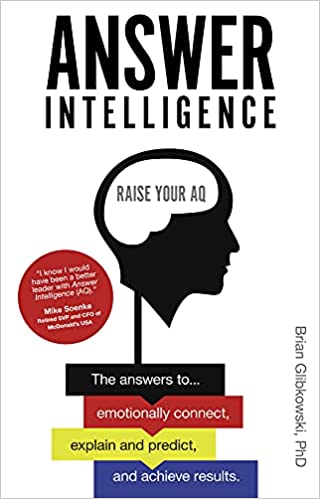In grade school, you learned about the six "WH" questions (why, what, when, where, who, how). You did not learn about a parallel list of answer types.
I've picked out three quotes for this piece that I consider to be representative of society's thought leaders. These luminaries, too, are focused upon questions, not answers:
"Judge a man by his questions rather than his answers," from philosopher Voltaire; "We thought that we had the answers, it was the questions we had wrong," from U2's Bono; and, "If I had an hour to solve a problem, I would spend the first 55 minutes determining the proper question to ask," from scientist Albert Einstein.
The professor stresses the research question, not the research answer. On Amazon, business books with question in the title outnumber books with answer in the title three to one. The imbalance is real. We are all focused upon questions, not answers.
My new book, "Answer Intelligence: Raise Your AQ," is a direct response to the lack of awareness and critical examination that has been paid to answers.
By studying expert communicators, I identified six answer types (story, metaphor, theory, concept, procedure, action) that can be provided to important questions.
The most important thing I learned in researching my book is that answers are more important than questions, both in business and in life.
I will be the first to admit that I value both questions and answers. Choosing between them is like choosing between your children. But, if I'm pressed to choose a side, I would argue that answers are the first among equals.
Here are three reasons why answers are more important than questions:
1. Answers come before questions.
Which came first, the chicken or the egg? Those in the know will point out that the egg came before the chicken. Two birds that were not chickens mated and created the first "chicken egg." Hence, the egg came first.
Which comes first, a question or answer? Counterintuitively, I would argue that an answer always precedes a question. Before the explorers set sail for the New World, they questioned the prevailing answer at the time – that the world was flat.
In my book, the point that answers occur before questions is illustrated in the sales context. During cold calls, the goal of the sales rep is to get a first appointment with a prospect on the phone.
An analysis of 500,000+ cold calls from Gong revealed that the most effective way to win an appointment during a cold call was for the sales rep to provide a story or metaphor (or another answer, in AQ terms). That response tended to stimulate a question in the prospect. It's this question that becomes the reason they agree to the next sales call.
2. Answers are for influence.
As a consultant, I was hired because I could provide answers. Specifically, I would work with clients that had the questions figured out. For example, one client had employee-turnover problems, and they would ask me, "Why is turnover occurring?"
I was hired as a social scientist because of my knowledge of turnover theory. In other words, I was hired for my answers, not my questions.
More generally, answers are for influence. Story and metaphor provide emotional impact. Theory and concept explain and predict. Procedure and action achieve results.
3. Answers are more difficult than questions.
It's easy to come up with important why, what, and how questions for any topic. For a job interview, say, these questions could be: "What is your number one soft skill?", "Why should I hire you?", "How well do you work with others?"
Or, in a sales meeting: "What is your product?", "Why should I buy from you?", "How does your product work?" The difficult part is answering these questions.
In an interview context, each job candidate should be able to provide all six AQ answers for their number one soft skill. However, in working with college students entering the job market, I've found that 40 percent cannot identify a metaphor for their top soft skill.
If leadership is your number one soft skill, you should be able to define it. For example, leadership as a concept can be defined as holding people accountable and inspiring them to be their better selves. And, as a metaphor, leadership is a braided rope. Two ropes are strong separately, but made stronger when they're braided together. Accordingly, leaders who simultaneously hold people accountable and inspire them are more effective.
Question Yourself
When I prepare for a sales call, a client workshop, my next podcast, or any important conversation, I still anticipate the questions that are going to be asked, and try to ask thoughtful questions myself.
But, after my research, I now pay much more attention to the answers that are exchanged in a conversation.
First, I realize that every question starts as an imperfect answer that stimulates curiosity in the world. By reflecting upon answers, I gain an appreciation for the reasons why others ask questions. And when I reflect upon answers, I ask better questions myself.
Second, I focus upon answers because I want to meet the curiosity of questions with the equal force of answers – to influence and inspire meaningful change in others.
Finally, I focus upon answers because they are the more difficult aspect of the communication equation.
I will leave you with one final thought. The title of my book, and the accompanying website, reflects that answers, not questions, are underappreciated and a deserving focus of critical examination.
My hope is that my book will bring back into balance the yin and yang of communication. In that spirit, AQ has a hidden, secondary meaning. It also stands for "Answers + Questions."
Answers first, because they're an exciting new focus. And I want to encourage you to think about answers first, in a question-first world.
Buy the Book, Download the Review
Want to hear more about Dr Glibkowski's Answer Intelligence framework? Buy his ebook from the Mind Tools store now!
Mind Tools reviews the best new business books and the tested classics in its monthly Book Insight for the Mind Tools Club. So, if you’re a Club member or enterprise licensee, you can download or stream the "Answer Intelligence" Book Insight in text or audio format.
If you haven’t already signed up, join the Mind Tools Club and gain access to all 2,400+ resources, including approximately 400 Book Insights. For a corporate solution, take a look at our Mind Tools for Business site.
Your Answers, Please
Is the world too focused on questions? Do we pay enough attention to the answers we hear and give? How do you try to give good answers? Join the discussion, below.








Do we ask right and relevant questions? Even if we do we don't listen.
Needless to mention if right and relevant questions were asked and answered rightly, the world would not be in a chaos as it is right now.
God Bless
Very interesting and educative.
Interesting article. Even though I agree with the statements that answers are for influence and that providing good answers is probably more difficult than asking the right questions (not really convinced by the first argument) I don't think it's possible to state that "answers are more important than questions". They are two sides of the same coin. And it always depends on the situation you're in. To use the job interview example from the article, if you're the interviewer it's more important to ask the right questions to determine if the candidate is a good fit for your position. If you're the candidate, having good answers ready might be more important for you in that moment.
Agree with Ram Kumar's comments.
Also, taking into view the current( mainly political) climate of obfuscation and gaslighting, answers may not be honest answers but, simply serve the purpose of telling someone or even a multitude, what they want to hear; it is rarely the truth because, it seems that truth as a concept has lost its meaning and hence, chaos.